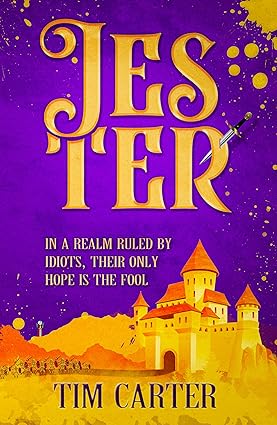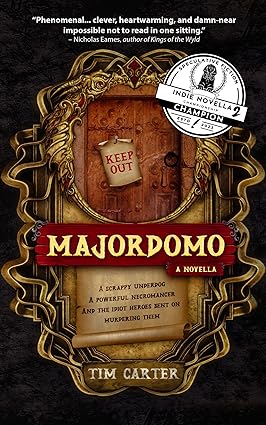What does ‘Cozy-Stabby’ fiction mean? - Tim Carter
30 Apr 2025The thing is, I’m rarely very original. When a reviewer described my debut novella, Majordomo, as ‘cozy-stabby’, it sounded better than anything I could come up with, so I stole it.
The problem is, people keep asking me to define the term, and I can hardly say: ‘I took it from a guy on Goodreads’.
So, weirdly, the question sent me back to my own writing looking for an underlying explanation.
I aim for characters with a lot of heart, as much situational humor as I can muster, and an overarching sense of fun. But neither Jester nor Majordomo really fits the conventional definition of ‘cozy’. The stakes are too high, the world is often malicious and unfair, and I hope to break your heart once or twice along the way if I can.
And yet, ‘cozy-stabby’ still sticks.
Looking at it from a distance, the cozy vibe comes not from what happens, but who the main characters are. Not their race or social standing, but who they are inside.
I’m a huge fan of Albert Camus, especially his signature novel, La Peste (The Plague in English). I’m especially fond of this quote, which anchors the theme of that book:
“This whole thing is not about heroism. It's about decency. It may seem a ridiculous idea, but the only way to fight the plague is with decency.”
I’ve used this as a guidepost in many projects, and it’s true of both Majordomo and Jester. The main characters are classic underdogs with none of the abilities one usually associates with fantasy heroes. One’s a kobold with club foot, the other a goblin slave with serious self-confidence issues.
They win out not through power, skill, or transactional relationships but through their inherent decency. It’s why I love them, and I believe it’s why readers happily go along for the ride with them.
Which isn’t to say that there’s no room for heroism. There are bad guys to see off, corrupt nobles to outmaneuver, and rank stupidity coming at my guys from all directions.
But my heroes’ superpower is never the ability to ride dragons, cast fireballs, or engage in kick-ass sword fighting. Mostly they suck at head-to-head combat.
They rarely know how to deal with the crisis that confronts them. That’s what makes them fun. The story is less about solving the overarching plot problem than it is about characters navigating outrageous circumstances with decency, rather than heroism, as their guide.
This makes them feel cozy, even when the stakes and their actions are very much not.
Camus aside, none of this was deliberate. They’re simply the kind of heroes I like. But having stumbled into this sub-niche (with due credit to the anonymous Goodreads reviewer who invented it), I think I’ll stay for a while. It’s a pleasant place to visit, even if occasionally you have to stab someone to death in a dark alley.

Jester is the latest release of Tim Carter. You can order it using this link.

